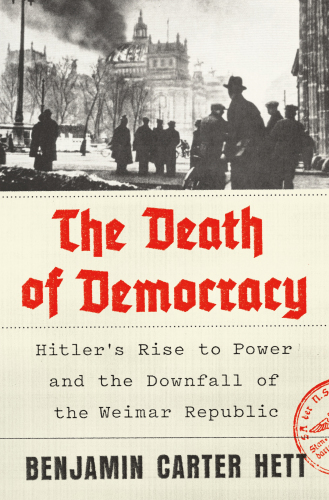
The Death of Democracy
Hitler's Rise to Power and the Downfall of the Weimar Republic
فرمت کتاب
ebook
تاریخ انتشار
2018
نویسنده
Benjamin Carter Hettناشر
Henry Holt and Co.شابک
9781250162519
کتاب های مرتبط
- اطلاعات
- نقد و بررسی
- دیدگاه کاربران
نقد و بررسی

February 15, 2018
How did Adolf Hitler, an obvious extremist, con a nation into backing him? This historical essay answers the question, to often unsettling effect.Hett (History/Hunter Coll.; Burning the Reichstag: An Investigation into the Third Reich's Enduring Mystery, 2013) observes that, by design, Hitler entered the German government with only two of his fellow Nazis holding cabinet-level positions. He wanted to appear powerless, it seems, and to give the impression that the right-wingers who had put him into office, who "sought to take advantage of Hitler's demagogic gifts and mass following to advance their own agenda," were actually in control of the situation. In the context of the Weimar Republic, whose system of representational democracy inadvertently splintered any organized resistance, Hitler was able to build an effective right-wing alliance that, in time, caused liberals to wonder whether democracy itself might be to blame if someone like Hitler could gain votes. It was "monstrous," one Berlin paper wrote, that so large a portion of the electorate had supported "the commonest, hollowest and crudest charlatanism," even as establishment conservatives bridled at having to work with what Paul von Hindenburg called "the Bohemian private"--but did so anyway. One constitutional crisis later, in the form of the burning of the Reichstag--the work, very likely, of the stormtroopers themselves--and democracy was suspended, the fate of the Jews and political opponents effectively settled, and war practically inevitable. It doesn't take too much of a stretch to find uncomfortable historical parallels in the current political scene, and Hett, though careful to support each of his assertions with scholarship, doesn't shy away from those possibilities. In the end, he writes, what won Hitler his power was the assent of the disaffected, who forgave him his sins and excesses in the hope that he would provide for them "the fastest and easiest solutions to their own particular problems."A provocative, urgent history with significant lessons for today.
COPYRIGHT(2018) Kirkus Reviews, ALL RIGHTS RESERVED.

March 5, 2018
Hett, an associate professor of history at Hunter College and CUNY, persuasively challenges familiar arguments that the rise of Nazi Germany was an inevitable consequence of abstract forces like racism, militarism, and capitalism. Hitler’s appointment as chancellor in 1933 was, he argues, a political gambit orchestrated by “a small circle of powerful men... who sought to take advantage of his demagogic gifts and mass following to advance their own agenda.” This cabal of businessmen, generals, and administrators held Hitler and his message in contempt and were confident they could use and discard him, detaching him from his base and shepherding his followers into a conventional right-wing authoritarian system. Hett’s page-turning account lays out the dire consequences of their simultaneously underrating Hitler’s ability and grievously overestimating their power. He demonstrates that Hitler played a deeper game, exploiting his opponents’ narrow self-interests and using sophisticated sleight of hand to score and build on seemingly inconsequential successes. The increasing bewilderment of this cabal defies conventional explanation, but Hett concludes with a possible clue: the “incongruous innocence” of a society unable to imagine that the worst could happen. Scholars and general readers alike will learn something from Hett’s credible analysis of right-wing power brokers’ role in Hitler’s ascent.

March 15, 2018
Hett (history, Hunter Coll.; Graduate Ctr., City Univ. of New York; Burning the Reichstag) examines the tumultuous and violent politics of Weimar Germany. Using primary and secondary sources along with memoirs and diaries, Hett places German politics within the broader context of postwar globalization. The author shows how the Nazis were one of many left- and right-wing movements that took root during this crisis-filled period across Europe. As part of a growing trend in globalization, the Nazis were not immune to outside influences. In particular, Adolf Hitler admired Turkey's founder, Kemal Atatürk, and praised the Armenian genocide as a necessary step toward consolidating power. However, Hitler's rise and eventual appointment as chancellor would not have been possible if not for conservative politicians, who sought to manipulate the party to secure policies favorable for themselves. Hitler understood this and rarely made pacts that did advance his agenda. VERDICT The international roots of the Nazi movement come into sharp focus in this illuminating and essential book detailing the rise of the Third Reich.--Chad E. Statler, Westlake Porter P.L., Westlake, OH
Copyright 2018 Library Journal, LLC Used with permission.

March 15, 2018
Hett (Burning the Reichstag, 2013) asks how Germany's state-of-the-art modern democracy could elect an intemperate, authoritarian radical, who, within weeks of assuming the chancellorship, would suspend civil liberties, dissolve the German legislature and its federal system, and begin mobilizing for genocidal war. A typical answer, refined here, is that economic malaise and the legacy of WWI created an opportunity for an antidemocratic alternative, which Hitler, with his talents as an orator and political strategist, shrewdly exploited. But Hett also reminds us that Hitler was deliberately enabled by conservative elites, especially business leaders and military commanders, who wanted the electoral votes of the Nazi movement and were willing to overlook its excesses to achieve their goals of demolishing the labor movement and rebuilding the armed forces. Hitler was also enabled by a disaffected public increasingly prone to aggressive myth-making and irrationality yet also fatally naive, assuming Hitler's rule would be brief and unable to imagine the worst possibilities. At no point does Hett mention any current political figure by name, but his warning is nonetheless loud, clear, and urgent.(Reprinted with permission of Booklist, copyright 2018, American Library Association.)

























دیدگاه کاربران